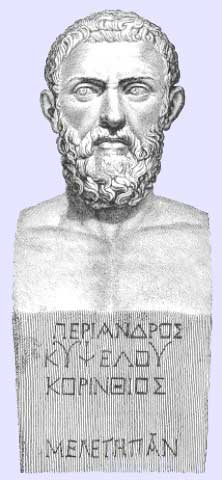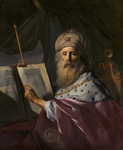.

Periander (627 – 585) BC, son of Cypselus ruler of Corinth for more than 40 years. He was considered one of the Seven Sages of Greece.
He restricted the number of slaves in Corinth trying to keep the citizens always busy in order to prevent them from conspiring against him. He supported greatly the arts, constructing various buildings and inviting poets and noted writers like Arion, Aesop and others. He tried to cut a naval passage through the Isthmos but he was prevented from the Delphic Oracle, who warned him not to proceed. The real reason, that he did not try though, was that such a giant project was above the technical capabilities of his time. Instead he constructed the Diolcos, a stone road that ships were carried on wheeled platforms from the eastern port of Cenchreae, in the Saronic gulf, to the western port of Lechaeon, in the Corinthian gulf. Periander founded new colonies for Corinth such as Naucratis in Egypt. His brought economic wealth in Corinth, the arts flourished, as well crafts and architecture.
But there is also a dark side. Although he was a intelligent ruler he was not wise as Plato correctly did not consider him among the wise men.
He killed his wife Melissa listening to slanders of his concubines, discovering later that the stories were wrong. This incident made the younger of his two sons with Melissa, Lykophron, to alienate from him and finally was sent to Corkyra. Periander tried to bring him back but Lykophron only accepted to rule Corinth, when his father promised him, that he would come to stay in Corkyra, in his place. The Corkyreans didn't like this idea and they killed Lykophron. Periander's revenge was to kill 50 Corkyreans and sent 300 of their children to Lydia to become eunuchs, but at the island of Samos the people gave them sanctuary in the temple of Artemis. He killed many outstanding citizens of Corinth who were against an idea of a war with Sikyon
LINKS
Dragging a ship across the Isthmus of Corinth. The Corinthians made a fortune by dragging boats put on sleds and rolled on logs across the four miles of land that separates the Adriatic from the Aegean Sea (by means of the diolkos, a stone-paved road linking the ports of Cenchraea to Lechaeon).
| Ancient Greece
Science, Technology , Medicine , Warfare, , Biographies , Life , Cities/Places/Maps , Arts , Literature , Philosophy ,Olympics, Mythology , History , Images Medieval Greece / Byzantine Empire Science, Technology, Arts, , Warfare , Literature, Biographies, Icons, History Modern Greece Cities, Islands, Regions, Fauna/Flora ,Biographies , History , Warfare, Science/Technology, Literature, Music , Arts , Film/Actors , Sport , Fashion --- |
Retrieved from "http://en.wikipedia.org"
All text is available under the terms of the GNU Free Documentation License



